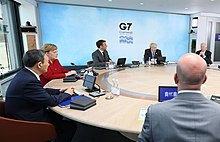| Abbreviation | B3W |
|---|---|
| Formation | 2021; 4 years ago (2021) |
| Founder | G7 |
| Purpose | Promote economic development and inter-regional connectivity |
| Location |
|
Build Back Better World (B3W) was an initiative undertaken by the G7. Launched on June 12, 2021, it would provide an alternative to China's Belt and Road Initiative (BRI) for infrastructure development of low- and middle-income countries. Ultimately, B3W investment was not detailed beyond the program's general principles. After difficulties in implementing the Biden Administration's domestic Build Back Better Plan agenda, the B3W was re-branded as the Partnership for Global Infrastructure and Investment.
The initiative sought to address the $40 trillion worth of infrastructure needed by developing countries by 2035. It aimed to catalyze funding for quality infrastructure from the private sector and will encourage private-sector investments that support "climate, health and health security, digital technology, and gender equity and equality". The initiative was intended to build on the Blue Dot Network, a collaboration that aims to build a global network through lending-based financing to build roads, bridges, airports, ports, power plants.
Standards and principles

The B3W efforts were in line with the standards and principles of the Blue Dot Network (BDN), relating to the environment and climate, labor and social safeguards, financing, construction, anticorruption, and other areas. On November 4, 2019, U.S. Under Secretary of State Keith Krach formally launched the BDN with his Australian and Japanese counterparts with access to US$60 billion of capital from the U.S. International Development Finance Corporation (DFC) at the Indo-Pacific Business Forum in Bangkok.

Krach announced the BDN's global trust standards, which are based on "respect for transparency and accountability, sovereignty of property and resources, local labor and human rights, rule of law, the environment, and sound government practices in procurement and financing." Under Secretary Krach committed $2 million (USD) of U.S. State Department seed money for the steering committee and issued an invitation to other G7 members to join. On October 19, 2020, on behalf of the twelve Three Seas nations, President Kersti Kaljulaid endorsed the BDN and the Three Seas Summit in Tallinn, Estonia.

On June 7, 2021, the Organisation for Economic Co-operation and Development (OECD) committed to support the BDN at the meeting of the latter's executive consultation group in Paris, France.
Re-branding
B3W was not ultimately detailed beyond the program's general goals. Following legislative difficulties in implementing the Build Back Better domestic agenda, B3W was re-branded as the Partnership for Global Infrastructure and Investment.
See also
- New Silk Road Initiative
- The Clean Network
- Equator Principles
- Blue Dot Network
- Global Gateway
- India-Middle East-Europe Economic Corridor
References
- "G7 rivals China with grand infrastructure plan". Reuters. 2021-06-12. Retrieved 14 June 2021.
- "G7 adopts infrastructure plan to rival China's belt and road strategy". South China Morning Post. 2021-06-12. Retrieved 14 June 2021.
- "Asian Countries Welcome G7's Answer to China's One Belt, One Road Program".
- "Under Secretary Krach Advances Global Economic Security at Indo-Pacific Business Forum". U.S. Mission to ASEAN. 12 November 2019. Archived from the original on 30 December 2021. Retrieved 3 July 2021.
- "US-Led Initiative Aims to Make Mark on Global Infrastructure Development | Voice of America - English". www.voanews.com. 31 January 2020. Retrieved 2021-07-05.
- "Under Secretary Krach: Clean Vision for Three Seas". U.S. Embassy in Estonia. 2020-10-21. Retrieved 2021-07-05.
- "Inaugural Meeting of the Blue Dot Network's Executive Consultation Group, 7 June 2021 - OECD". www.oecd.org. Retrieved 2021-07-05.
- Garlick, Jeremy (2024). Advantage China: Agent of Change in an Era of Global Disruption. Bloomsbury Academic. ISBN 978-1-350-25231-8.
- Curtis, Simon; Klaus, Ian (2024). The Belt and Road City: Geopolitics, Urbanization, and China's Search for a New International Order. New Haven and London: Yale University Press. ISBN 9780300266900.